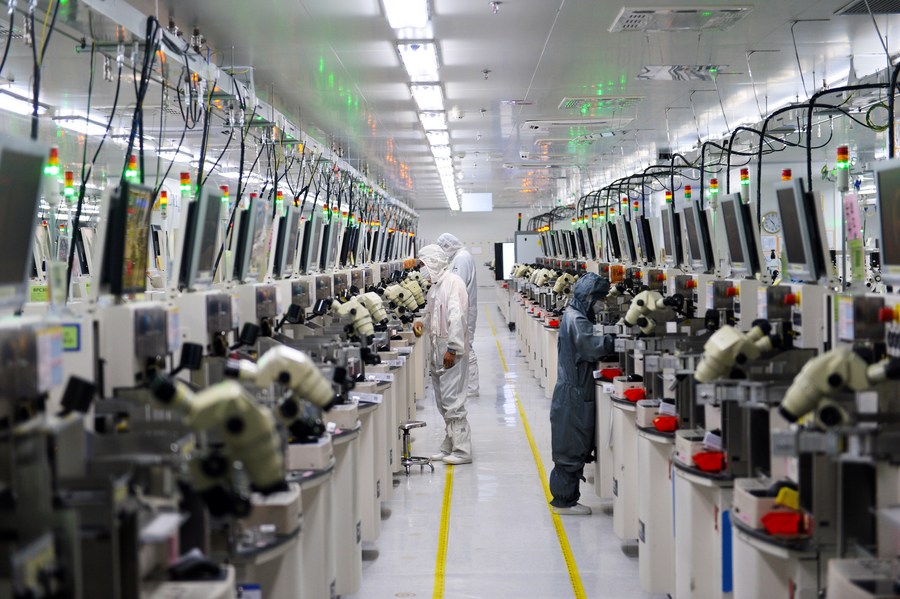Private economy booms at Maritime Silk Road starting point

Employees work at an intelligent workshop of Lightning optoelectronic Co., Ltd. in Anxi County of Quanzhou, southeast China's Fujian Province, June 16, 2023. (Xinhua/Liu Yongzhen)
FUZHOU, June 18 (Xinhua) -- Located on the coastline of east China's Fujian Province, Quanzhou is widely believed to be the starting point of the ancient Maritime Silk Road.
Once one of the world's largest ports along the historic route, particularly in ancient China's Song and Yuan dynasties hundreds of years ago, the city is thriving again with a booming private economy.
Quanzhou's GDP stood at 1.21 trillion yuan (about 169.73 billion U.S. dollars) in 2022, to which private enterprises contributed over 80 percent.
The private economy has also generated about 70 percent of the city's total tax revenues and 90 percent of its urban jobs, nurturing nine industrial clusters, each with an output value of over 100 billion yuan, including traditional industries like textile and machinery and emerging ones like electronics.
Zhang Renquan moved with his team to an industrial park in Anxi in Quanzhou ten years ago. He is now the human resources director of Fujian Lightning Optoelectronic, a leading company providing high-power LED parts and semiconductor encapsulation.
He recalled that local government workers introduced beneficial policies for industry, information, technology, and taxation soon after the company started its business in the park.
"These policies and the government's other efforts in improving the industry chain led the local competitive industries to form an industrial cluster," Zhang said.
As a result, Anxi realized an industrial transformation from solely relying on traditional industries like steel and furniture to emerging ones like optoelectronics.
Sanan Sino-Science was co-founded by Fujian Sanan Group and the Institute of Botany, the Chinese Academy of Sciences, in 2015, with a total investment of 7 billion yuan. It focuses on the industrialization of lighting products for plants, bio-pharmaceuticals raw materials' cultivation, and new drugs for severe plant diseases.
It has the world's largest LED-illuminated single-building plant factory and China's best photobiology technology.
Li Yang, director of Sanan Sino-Science, said that the company utilizes LED illumination and automation equipment to shorten the growth cycle of plants, and the daily yield of high-quality vegetables with no pesticide or metal contamination stood at 1.8 tonnes.
Sanan Sino-Science has so far applied for 524 patents in China and 156 ones abroad, and the company's advanced techs and equipment have been exported to over 33 countries and regions, including the United States and Japan, making it a whole-chain high-tech enterprise on innovation and industrialization of plant factory, Li added.
As the emerging industries in Quanzhou are expanding at full speed, the traditional ones are still playing a pillar role and upgrading.
With the spirit of "daring to be the first in the world and striving hard to win," Jinjiang in Quanzhou has transformed from a "high-yield but poor county" with a large population and little land to "No. 1 in Fujian" and "Top 10 in China" with a developed private economy.
Over the years, Jinjiang has blazed a path of county-level regional development supported by the private and real economy.
In 2022, the GDP of Jinjiang increased by 4 percent year on year to 320.74 billion yuan, among the top five of all Chinese county-level cities.
Jinjiang's over 90,000 private-owned businesses take up over 90 percent of the enterprise amount, production value, tax revenue, and jobs in the city. Footwear and garment are the strongest among local industries, with sports brands like ANTA and Xtep best known to Chinese customers.
The local government has also exerted efforts to encourage innovation and attracted nine national-level scientific research institutes and four colleges. Over 640 high-tech companies have invested 6 billion yuan in research and development.
Wang Wenqi, head of China Leather and Footwear Industry Research Institute Jinjiang CO., LTD., said that the colleges focus on innovation of basic technology, research institutes on product innovation, and private enterprises on business innovation.
He added that the future trend of sports footwear products is high quality, green, and smart, and with continuous innovation, more Chinese brands will go global.


